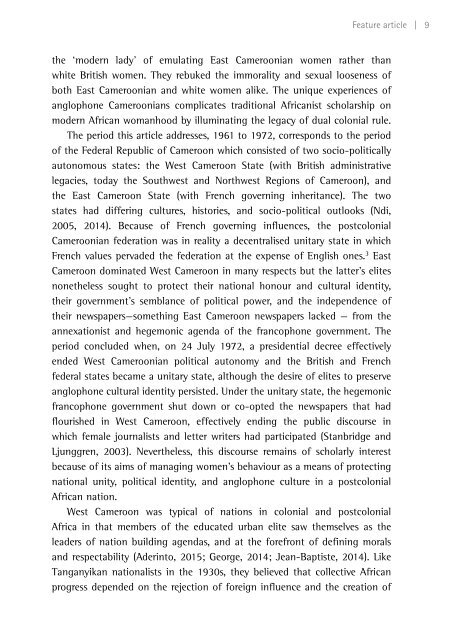The politics of fashion and beauty in Africa
fa21_proof_3
fa21_proof_3
You also want an ePaper? Increase the reach of your titles
YUMPU automatically turns print PDFs into web optimized ePapers that Google loves.
Feature article | 9<br />
the ‘modern lady’ <strong>of</strong> emulat<strong>in</strong>g East Cameroonian women rather than<br />
white British women. <strong>The</strong>y rebuked the immorality <strong>and</strong> sexual looseness <strong>of</strong><br />
both East Cameroonian <strong>and</strong> white women alike. <strong>The</strong> unique experiences <strong>of</strong><br />
anglophone Cameroonians complicates traditional <strong>Africa</strong>nist scholarship on<br />
modern <strong>Africa</strong>n womanhood by illum<strong>in</strong>at<strong>in</strong>g the legacy <strong>of</strong> dual colonial rule.<br />
<strong>The</strong> period this article addresses, 1961 to 1972, corresponds to the period<br />
<strong>of</strong> the Federal Republic <strong>of</strong> Cameroon which consisted <strong>of</strong> two socio-politically<br />
autonomous states: the West Cameroon State (with British adm<strong>in</strong>istrative<br />
legacies, today the Southwest <strong>and</strong> Northwest Regions <strong>of</strong> Cameroon), <strong>and</strong><br />
the East Cameroon State (with French govern<strong>in</strong>g <strong>in</strong>heritance). <strong>The</strong> two<br />
states had differ<strong>in</strong>g cultures, histories, <strong>and</strong> socio-political outlooks (Ndi,<br />
2005, 2014). Because <strong>of</strong> French govern<strong>in</strong>g <strong>in</strong>fluences, the postcolonial<br />
Cameroonian federation was <strong>in</strong> reality a decentralised unitary state <strong>in</strong> which<br />
French values pervaded the federation at the expense <strong>of</strong> English ones. 3 East<br />
Cameroon dom<strong>in</strong>ated West Cameroon <strong>in</strong> many respects but the latter’s elites<br />
nonetheless sought to protect their national honour <strong>and</strong> cultural identity,<br />
their government’s semblance <strong>of</strong> political power, <strong>and</strong> the <strong>in</strong>dependence <strong>of</strong><br />
their newspapers—someth<strong>in</strong>g East Cameroon newspapers lacked — from the<br />
annexationist <strong>and</strong> hegemonic agenda <strong>of</strong> the francophone government. <strong>The</strong><br />
period concluded when, on 24 July 1972, a presidential decree effectively<br />
ended West Cameroonian political autonomy <strong>and</strong> the British <strong>and</strong> French<br />
federal states became a unitary state, although the desire <strong>of</strong> elites to preserve<br />
anglophone cultural identity persisted. Under the unitary state, the hegemonic<br />
francophone government shut down or co-opted the newspapers that had<br />
flourished <strong>in</strong> West Cameroon, effectively end<strong>in</strong>g the public discourse <strong>in</strong><br />
which female journalists <strong>and</strong> letter writers had participated (Stanbridge <strong>and</strong><br />
Ljunggren, 2003). Nevertheless, this discourse rema<strong>in</strong>s <strong>of</strong> scholarly <strong>in</strong>terest<br />
because <strong>of</strong> its aims <strong>of</strong> manag<strong>in</strong>g women’s behaviour as a means <strong>of</strong> protect<strong>in</strong>g<br />
national unity, political identity, <strong>and</strong> anglophone culture <strong>in</strong> a postcolonial<br />
<strong>Africa</strong>n nation.<br />
West Cameroon was typical <strong>of</strong> nations <strong>in</strong> colonial <strong>and</strong> postcolonial<br />
<strong>Africa</strong> <strong>in</strong> that members <strong>of</strong> the educated urban elite saw themselves as the<br />
leaders <strong>of</strong> nation build<strong>in</strong>g agendas, <strong>and</strong> at the forefront <strong>of</strong> def<strong>in</strong><strong>in</strong>g morals<br />
<strong>and</strong> respectability (Ader<strong>in</strong>to, 2015; George, 2014; Jean-Baptiste, 2014). Like<br />
Tanganyikan nationalists <strong>in</strong> the 1930s, they believed that collective <strong>Africa</strong>n<br />
progress depended on the rejection <strong>of</strong> foreign <strong>in</strong>fluence <strong>and</strong> the creation <strong>of</strong>



